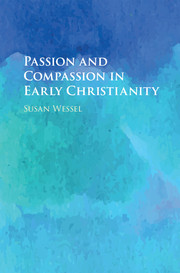Book contents
- Passion and Compassion in Early Christianity
- Passion and Compassion in Early Christianity
- Copyright page
- Dedication
- Contents
- Preface and acknowledgments
- Maps
- Chapter 1 The setting
- Chapter 2 Suffering
- Chapter 3 Disgust
- Chapter 4 Feelings
- Chapter 5 Charity
- Chapter 6 Love
- Chapter 7 Reflections
- Notes
- Select bibliography
- Index
Chapter 4 - Feelings
Published online by Cambridge University Press: 05 May 2016
- Passion and Compassion in Early Christianity
- Passion and Compassion in Early Christianity
- Copyright page
- Dedication
- Contents
- Preface and acknowledgments
- Maps
- Chapter 1 The setting
- Chapter 2 Suffering
- Chapter 3 Disgust
- Chapter 4 Feelings
- Chapter 5 Charity
- Chapter 6 Love
- Chapter 7 Reflections
- Notes
- Select bibliography
- Index
Summary
- Type
- Chapter
- Information
- Passion and Compassion in Early Christianity , pp. 98 - 129Publisher: Cambridge University PressPrint publication year: 2016



